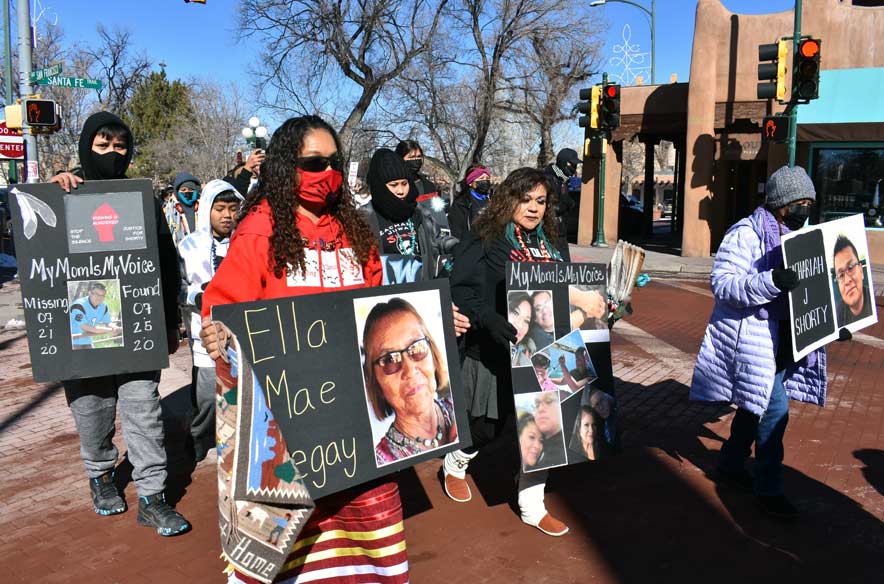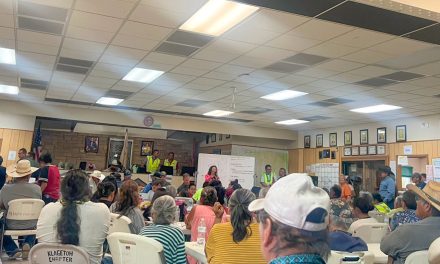
‘We want justice!’ Diné leaders rally for bills to tackle missing, murdered resources

Navajo Times | Rima Krisst
Families of missing and murdered Indigenous march from the Santa Fe Plaza to the state Capitol on Indian Day last Friday.
SANTA FE
Single digit temps did not deter lawmakers, tribal leaders and Missing and Murdered Indigenous Woman and Relatives advocates from marching from the Santa Fe Plaza to the Roundhouse on Indian Day in support of two bills moving through the New Mexico Legislature.
If passed, Senate Bills 12 and 13 would help families of missing and murdered loved ones by codifying coordination between law enforcement agencies, improve data collection, education and training, and set a platform for information sharing, said rally organizer Arlinda Deschene.
“We cannot continue to exempt our responsibility as lawmakers to go another day without addressing our missing and murdered not being accounted for in this state,” said the bills’ co-sponsor Sen. Shannon Pinto, D-McKinley-San Juan.
Pinto expressed appreciation for participants who travelled at their own expense to speak to the importance of locating and seeking justice for missing and murdered relatives.
“We need our voices to be heard, because these are our children who are missing,” McKinley County Commissioner Genevieve Jackson said at the rally. “Our blood runs in their blood.”
“We will no longer be silenced,” said Navajo Nation Council Delegate Amber Kanazbah Crotty. “We want to know what happened to our babies. We want our lives to be valued.”
Crotty said the MMIWR issue is more than an epidemic.
“This is a crisis!” said Crotty. “We need to stop normalizing violence and our community members being missing … This is a reckoning we’re seeing here.”
Many speakers pointed to systemic racism, law enforcement jurisdictional divides that foster inequities, and the perpetuation of inter-generational trauma that often leave Indigenous missing and murdered and their families marginalized or ignored.
Deschene shared that New Mexico has the highest rate of missing and murdered Indigenous persons in the United States, with Albuquerque and Gallup reporting in the top 10 cities nationwide with unresolved MMIWR cases.
“This genocide is going across North America, South America,” said rally organizer Patricia Michaels. “The genocide is real and it needs to stop!”
‘Help us find them’
A tearful Vangie Randall-Shorty told the story of her son, Zachariah Shorty, 23, who went missing in July 2020, from a motel in Farmington and was found dead days later near the San Juan River by Nenahnezad Chapter.
“I am Zachariah’s mom and I am Zacharias voice,” said Shorty.
To this day, her family has no answers as to who killed her son, which has caused prolonged agony for Shorty and her family.
“Zach was murdered,” she said. “I never knew that I would be a parent standing up here… Today, I’m advocating for him.”
Shorty and many others testified that the jurisdictional problems that plague Indian Country are a barrier to getting cases solved.
“Jurisdictions need to be lifted,” she said. “It doesn’t matter what our color is. We need the same response as a white person. This has gone on far too long.”
Crotty, who was instrumental in establishing the Missing and Murdered Diné Relatives task force in 2019, said families like Shorty’s need to be supported, not shunned.
“Give resources for the families to come together,” said Crotty. “Let them know they’re not alone. Do not victim shame and blame our missing relatives. Help us find them!”
‘We are resilient’
Sponsored by Pinto and Senator Linda Lopez, D-Bernalillo, SB12 would give the attorney general authority to investigate and prosecute missing Indigenous persons cases and hire a “missing Indigenous person specialist” to work closely with local, state, federal and tribal law enforcement agencies.
“We are resilient and we are survivors,” said Pinto. “It’s time for us to make sure we do our part to ensure we have a better, safer community. Nobody should be walking around in fear. That is not the life the Creator wanted for us.”
SB12 would also fund a grant program with an initial $1 million to create an information sharing network for New Mexico’s tribes, nations and pueblos to help identify, report and find missing community members.
“We know there are resources out there to help us tackle this issue,” said Pinto. “We just need that seed money.”
Separately, SB13, sponsored by Pinto, Lopez, and Rep. Andrea Romero, D-Santa Fe, would create an annual “Missing in New Mexico” event that would bring federal, state, local and tribal governments together to help families file and update missing persons reports and meet with investigators.
In 2019, Gov. Michelle Lujan Grisham signed a law establishing a Missing and Murdered Indigenous Women Task Force and Pinto said now is the time to forge changes that need to be made.
‘Closure and healing’
“Our focus is to bring all of our children home,” said Navajo Nation Council Delegate Nathanial Brown. “They’re not forgotten because we’re standing here. We love our people and we’re not going to give up on them.”
Brown emphasized the process of healing for families of missing and murdered is paramount and SB13 would give survivors access to support groups, counseling, traditional healers, and victim advocates.
“In order to restore harmony and begin the healing process for our families, criminal cases must fully be investigated and prosecuted,” said Delegate Carl Slater. “We must bring closure and healing to our missing relatives across Indian Country.”
Pamela Foster, mother of Ashlynne Mike, who was abducted and brutally murdered in Shiprock in 2016, said the grief never stops but change is possible.
“Until you have actually experienced a missing or murdered loved one, you don’t know the pain that we have,” she said. “We fight hard to help bring awareness to our leaders.”
Foster’s advocacy in her daughter’s memory led to the passage of the Ashlynne Mike AMBER Alert in Indian Country Act in 2018, which brought protection for Indigenous children by giving resources to tribes to help them implement their own Amber Alert systems.
“I know the pain we are all feeling, having lost my own daughter at only 11 years old,” said Foster. “The pain is something we can never heal from. It’s going to be with us for the rest of our lives.”
Rep. Anthony Allison, D-San Juan, believes the Ashlynne Mike case represented a watershed moment in the MMIWR movement on the Navajo Nation.
“Before then you used to think this is an urban problem, not a rural problem,” said Allison. “You used to hear about things like that in the big cities but never in our hometowns. It was overwhelming in that way.”
He said it’s really important that people attend gatherings like the one held on Friday to hear what’s happening from those directly impacted.
“Although it may be hard to get answers, we should assist the families so they do not feel abandoned and alone in this struggle,” said Allison. “The ultimate goal is to bring our missing home, and to help the families of the murdered cope with their loss…”
‘Falling through the cracks’
Shorty said, as it stands, criminals have more rights than victims and their families do.
“They should be held accountable for their actions,” she said. “They took Zachariah’s life and they are still out there living their lives. I pray every single day that those who are responsible for his murder speak up.”
Taos Pueblo fashion designer and longtime MMIWR advocate Patricia Michaels said Native Americans are often put in prison at the “drop of a pin,” and yet families of missing and murdered do not get the justice they deserve.
“What about our victims and the people who hurt them?” she said. “How come their cases aren’t solved?”
Commissioner Jackson said law enforcement, the FBI and prosecutors need to work together to help families solve cases.
“We cannot be divided by jurisdictional issues any longer,” said Jackson. “That’s why our children are falling through the cracks here. They are the victims of a broken system.
“There is absolutely no coordination, collaboration and communication between these agencies and it is doing our people a huge disservice,” said Jackson. “We hear the same excuses — there are no resources, no money. I’m so tired of it. When are we going to have the money to stop these atrocities?”
‘Where’s the urgency?’
Seraphine Warren, who’s 62-year-old aunt, master rug-weaver Ella Mae Begay, went missing from her home in Tolikan, Arizona, last summer, said she, too, has gotten little help from law enforcement in her search.
“How many times do I have to go to the agents to try to get the help I need!?” asked Warren. “Helicopters, drones, cadaver dogs, sonar – those are some of the things I really need right now. Seven months my aunt’s been missing. Where’s the urgency?”
Crotty said because the piecemeal law enforcement system is under resourced and disjointed, the burden often falls on families to advocate for their missing or murdered relatives.
“They continue to be missing and we have no strategic response for them,” she said. “Why is it that our grandmas and aunties are being the investigators?”
Families are also lacking the support and resources needed to heal, she said.
“They’re left isolated, alone, to process a system that doesn’t work for them,” said Crotty. “To go home every night not knowing – we need the mental health workers to check on them. We need trauma informed counseling and care.”
‘They deserve dignity’
With New Mexico’s historic surplus of funding this year, Crotty said passing Pinto’s bills is an opportunity for the state to begin rectifying some of the outstanding issues at hand.
“Time is of the essence,” said Pinto.
“These issues have a solution,” said Angel Charlie, director of the Coalition to Stop Violence Against Native Women. “Auntie Crotty has said over and over, when a DUI happens, jurisdiction is able to be transcended. What about our women, our missing? We know the system can do it. Do it!”
Those perpetrating crimes need to be brought to justice, said Pinto.
“We need to know we are looking for them and they better be running, because we are going to catch up to them,” she said.
In the meantime, Crotty said families who are suffering and they deserve communication from law enforcement with case updates.
“They deserve the dignity that you give everyone else,” she said. “We want that same treatment.”
Crotty and others noted that everyone witnessed how a country can mobilize when looking for one missing woman, referring to the national search for Gabby Petito, who became a household name when she went missing last fall.
“We want that for our relatives,” said Crotty. “We want the search and rescues. We want the investigation and the prosecution. We want justice!”
‘It’s wrong’
Several New Mexico legislators, including Sen. Harold Pope, D-Bernalillo, spoke in support of SB12 and SB13 in front of the Roundhouse.
“In the past few years, we’ve been talking a lot about social justice and the inequities and how we’re treated,” said Pope. “And the retort back is ‘all lives matter,’ but that’s just not the case…”
Pope said the reality is when someone is murdered or missing, if they are not of a certain class or race, they aren’t guaranteed the support they need to figure out what has happened.
“I’m just outraged that this is happening to our Indigenous communities that have been here since time immemorial,” said Pope.
He said the families of victims should not have to attend rallies to raise awareness about their cases.
“It’s wrong,” he said. “This has to end, and we need you to help us do that.”
SB12 was heard by the Senate Judiciary Committee on Monday night but no action was taken and it was scheduled to go back to the panel on Wednesday.
SB13 was passed unanimously by the Senate on Jan. 28 and is expected to be heard in the House of Representatives before the close of the legislative session on Feb. 17.
Information: www.nmlegis.gov








 Highway 264,
Highway 264, I-40, WB @ Winslow
I-40, WB @ Winslow